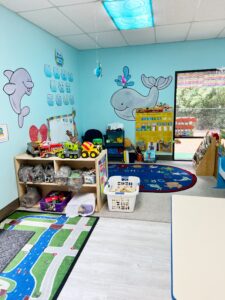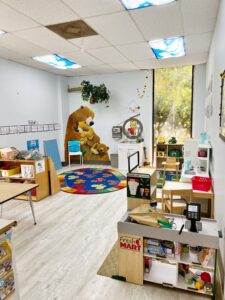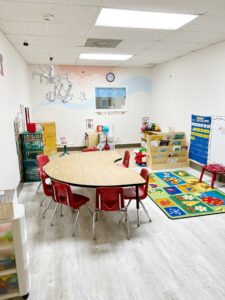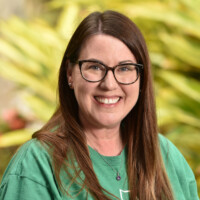Children learn best through exploration. We also know that all children learn differently so we offer activities that are not just auditory but visual and kinesthetic as well. Our days include circle times (1 secular and 1 biblical), playground time, snack time, and center time. We develop the skills they will need to be successful in the four year old program.
These activities include but are not limited to the following:
Math
- Numerals 1-10
- Counting objects to 10
- One-to-one correspondence of objects
- Sorting by various attributes: color, shape, size
- Sizes: small, medium, large
- Shapes: square, rectangle, circle, triangle, oval, diamond
- Matching: symbols, etc.
- Same and Different
- Directional and positional words
Literacy
- Exposure to alphabet: sounds (Zoo-Phonics)
- Phonemic and phonological awareness
- Recognize, trace first name
- Hold a pencil, marker, crayon correctly
- Retell familiar stories
- Draw pictures and dictate sentences about stories and experiences
- Answer questions about stories
- Repeat simple nursery rhymes and fingerplays
- Concepts of print: left to right direction, holding a book right-side-up
- Build new vocabulary
- Build listening skills
- Strengthen visual discrimination
- Sequencing
- Develop fine motor skills: play dough, scissors, writing utensils, Legos, etc.
Science
- Explore simple science tools
- Experience the world through nature walks, gardening, and other explorations
- Observe insect life
- Observe plant growth
- Observe weather and plant life during each season
- Measure and mix ingredients in cooking activities
- Identify basic colors and explore color mixing
- Explore the world with the five senses
- Investigate animals, the homes they live in, the food they eat
Creative Arts
- Explore a variety of art processes: painting, drawing, sculpture, collage, etc.
- Use a variety of art materials: crayons, tempera paint, watercolor paint, colored pencils, markers, chalk, etc
- Experiment with mixing paint colors
- Sing traditional songs and songs that enhance the curriculum
- Participate in movement songs and dances
- Use a variety of children’s instruments
- Participate in dramatic play
- Dramatize familiar stories
- Act out the movements and sounds of animals
Social Skills
- Practice problem-solving skills in social situations
- Work in groups on projects
- Share classroom materials with the group
- Practice using manners: please, thank you, excuse me, table manners
- Communicate his/her needs
- Take care of his/her own basic needs: clean up, fasten clothing, use tissue as needed, etc.
- State personal information: first and last name and age
- Explore modes of transportation
- Participate in projects to help others in need: Food drive
Social Studies
- Diversity: recognize and appreciate differences
- Explore community roles
- Geography: recognize locations in their environment
- History: understand past, present and future Religion
- Listen to Old and New Testament Bible stories
- Recognize that plants, animals, and human beings are God’s creations
- Recognize that God created families to love and take care of one another
- Learn about God’s love
- Listen to stories of the life of Jesus
- Learn Jesus’ teachings to love God and love others






Follow us on Facebook: